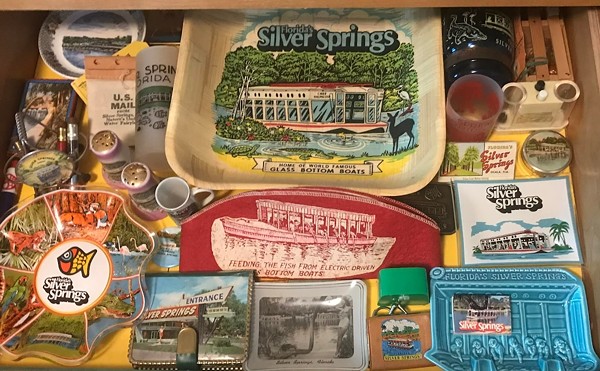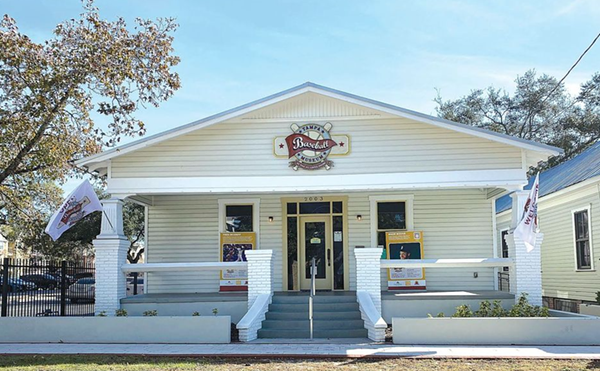Butcher Holler Here We Come
Silver Meteor Gallery, 2213 E. Sixth Ave., Ybor City, Tampa. 813-300-3585. No more local performances scheduled in the near future. Visit Aztec Economy's website, newyorkisdead.net, for future dates.
For all the talk about catharsis in the theater, it isn’t very often that you come upon the real thing. But it’s precisely catharsis — the purging of pity and terror from one’s psyche after they’ve been stirred up by a stunning drama — that I felt after watching Aztec Economy’s Butcher Holler Here We Come. This shattering play — “event” might be a better description — was presented last weekend at Ybor City’s Silver Meteor Gallery (in near darkness and very cold weather), and played like a combination nightmare, mystery rite, and horror ride at a depraved theme park. It took place in a center section of the narrow theater, with chairs for the audience lining opposite walls, so the effect was immersive as well as explosive. And though we ostensibly were sharing space with five emotionally challenged coal miners trapped in West Virginia, 1973, there were elements of the show so uncanny and unintelligible, I still don’t know exactly what I experienced. I do know that at the end I felt that cleansing of mind that Aristotle talks about — or was it just relief that the torment was over?
The play, written by Casey Wimpee, takes us far underground just as there’s an explosion trapping K-Bus, Hiccup, Muskie, Leander, and Jet far underground. The only lights that remain are the headlamps of the miners, and the prevailing emotions in the darkened cave are anxiety, anger, terror, supplication, and despair. (It’s easier to name the emotions from moment to moment than to figure out the “plot.”) Plunged into near-blackness as we are, it’s the dialogue that we mostly notice — and this ranges from absurd Brylcreem commercial jingles and the words of country songs to menacing exclamations, accusations, and threats of violence. One of the miners — Muskie — is either dead or in a coma; one other — Hiccup — relies on prayer to bring rescue; and one — K-Bus — gets high and threatens to break another’s kneecaps with a lead pipe if he doesn’t pass a bizarre test. There are (I think) flashbacks and flash-forwards, and there’s a segment suggesting that the mine explosion was intentional sabotage. The dialogue is poetic, telegraphic, and charged with danger, and Jet and Leander even have a talk where they list all major mine disasters from “Cripple Crick 1894” to “Springhill 1958.”
The acting is terrific: elemental, raw, and persuasively aggressive. The five performers — Adam Belvo (a USF graduate now living in Brooklyn), Isaac Byrne, Colt W. Keeney, Adam Laten Willson, and Cole Wimpee — are so successful, you come to think that their strange poetry is perfectly normal, and their predicament genuine. Leah Bonvissuto’s direction could hardly be more menacing — for once the Silver Meteor playing space is exactly right in size and shape — and Casey Wimpee’s script is, finally, awe-inspiring: not many writers use language so variegated and potent.
I’m not precisely sure what I saw and heard in the play’s 70 minutes, but I do know that it had the consistency of a shocking dream and the authority of brutal poetry. So maybe Aristotle’s “catharsis” isn’t the point; maybe the governing concept here is Artaud’s call for a “Theatre of Cruelty” that attacks the audience’s subconscious and acts upon us “like a spiritual therapeutics whose touch can never be forgotten.” In any case, Butcher Holler got through to me. It’s not often that I see theater so primordial or so deep.
Goodbye, Old Friend. My friend, neighbor, and occasional critic Larry Greene died last Friday. For years he had been reading my columns and offering his commentary, and I’d gotten into the habit of thinking of him when I was writing, wondering how my liberalism would fall upon his conservative soul, or my Jewish sensibility on his Christian psyche. Larry loved good language — he’d been a professor of German, a disc jockey and a software writer before he retired — and he was an expert on love who devoted his later years to looking after his wife, who was stricken with Alzheimer’s. Larry and I met every Saturday, at his home or mine, just to chat for a couple of hours on whatever subject came up — philosophy, physics, politics, or religion. And he taught me this Goethe poem, which I now offer as his epitaph: “Above all summits/it is calm./In all the tree-tops/you feel/scarcely a breath;/The birds in the forest are silent,/just wait, soon/you will rest as well!”'
Goodbye, old friend. I miss you already.


















